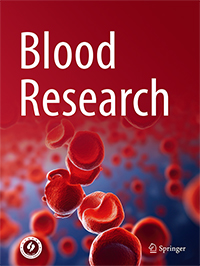Korean J Hematol 1995; 30(3):
Published online September 30, 1995
© The Korean Society of Hematology
토끼에서 안티트롬빈 Ⅲ 투여가 전신 슈발츠만 반응에 미치는 영향
지정희
부산 성분도병원 병리과
Effect of Antithrombin Ⅲ Administration on Generalized Shwartzman Reaction in Rabbits
Background: Generalized Shwartzman reaction(GSR) has been known to be an experimental model of disseminated intravascular coagulopathy(DIC). To date, the inhibitory effect of antithrombin Ⅲ on the GSR has not been reported. In this report, the effect of antithrombin Ⅲ administration on generalized Shwartzman reaction(GSR)
was studied in rabbits.
Methods: The classic GSR was produced two inuavascular injections of bacterial endotoxin given 24 hrs apart. The antithrombin Ⅲ was injected into the rabbits before
or after the provocative injection of the endotoxin. Plasma fibrinogen, fibrin-degraldation product(FDP) and plasminogen-levels, and factor XⅢ activities were measured at 12, 24 and 48 hrs a(leer the preparatory injection of the endotoxin, respectively. Both kidneys were examined grossly and then light microscopical studies were carried out at 48 hrs after the injection.
Results : The plasma fibrinogen, plasrninogen and the serum FDP levels increased in the endotoxin alone group, antithrombin Ⅲ group and the antithrombin Ⅲ plus endotoxin
group. The factor ⅩⅢ activity decreased in the endotoxin alone group, antithrombin Ⅲ group and the antithrombin Ⅲ plus endotoxin group. Bilateral renal cortical necrosis in
the antithrombin Ⅲ plus endotoxin group were mild when compared with endotoxin alone group, grossly and microscopically.
Conclusion: These results suggest that antithrombin Ⅲ plays a role in the reduction of GSR due to the formatirm of thrombin-antithrombin complexes which is known to
inhibit the conversion of fibrinogen to fibrin and the activation of factor XⅢ.
Keywords Generalized Shwartzman reaction, Antithrombin Ⅲ, Renal cortical necrosis
Article
Korean J Hematol 1995; 30(3): 387-396
Published online September 30, 1995
Copyright © The Korean Society of Hematology.
토끼에서 안티트롬빈 Ⅲ 투여가 전신 슈발츠만 반응에 미치는 영향
지정희
부산 성분도병원 병리과
Effect of Antithrombin Ⅲ Administration on Generalized Shwartzman Reaction in Rabbits
Chung Hee Chi
Department of Pathology, St. Benedict Hospital, Pusan, Korea
Abstract
Background: Generalized Shwartzman reaction(GSR) has been known to be an experimental model of disseminated intravascular coagulopathy(DIC). To date, the inhibitory effect of antithrombin Ⅲ on the GSR has not been reported. In this report, the effect of antithrombin Ⅲ administration on generalized Shwartzman reaction(GSR)
was studied in rabbits.
Methods: The classic GSR was produced two inuavascular injections of bacterial endotoxin given 24 hrs apart. The antithrombin Ⅲ was injected into the rabbits before
or after the provocative injection of the endotoxin. Plasma fibrinogen, fibrin-degraldation product(FDP) and plasminogen-levels, and factor XⅢ activities were measured at 12, 24 and 48 hrs a(leer the preparatory injection of the endotoxin, respectively. Both kidneys were examined grossly and then light microscopical studies were carried out at 48 hrs after the injection.
Results : The plasma fibrinogen, plasrninogen and the serum FDP levels increased in the endotoxin alone group, antithrombin Ⅲ group and the antithrombin Ⅲ plus endotoxin
group. The factor ⅩⅢ activity decreased in the endotoxin alone group, antithrombin Ⅲ group and the antithrombin Ⅲ plus endotoxin group. Bilateral renal cortical necrosis in
the antithrombin Ⅲ plus endotoxin group were mild when compared with endotoxin alone group, grossly and microscopically.
Conclusion: These results suggest that antithrombin Ⅲ plays a role in the reduction of GSR due to the formatirm of thrombin-antithrombin complexes which is known to
inhibit the conversion of fibrinogen to fibrin and the activation of factor XⅢ.
Keywords: Generalized Shwartzman reaction, Antithrombin Ⅲ, Renal cortical necrosis

Article Tools
Stats or Metrics
Related articles in BR
-
Nitric Oxide Synthesis in Murine Peritoneal Macrophages by Antithrombin Ⅲ
Jae Yong Kwak, Sang Youel Park, Hae Su Lee, Myung Hee Sohn, Chang Yeol Yim
Korean J Hematol 1997; 32(2): 234-247 -
The Efficacy of Antithrombin Ⅲ Concentrate in Disseminated Intravascular Coagulation
Seonyang Park, Chul Won Jung, Hae Ran Moon, Young Suk Park, Cheolwon Suh, Soon Nam Lee, Do Yeun Oh, Sun Ju Lee, Chul Soo Kim, Hee Sook Park, Kyung Sam Cho, Sang Jae Lee, Byoung Kook Kim, Il Young Choi
Korean J Hematol 1995; 30(1): 77-88 -
Effect of Antithrombin Ⅲ in Childhood Disseminated Intravascular Coagulopathy
Young Youn Choi, Tai Ju Hwang, Young Joon Kang
Korean J Hematol 1995; 30(1): 69-76




 PDF
PDF Standard view
Standard view Export citation
Export citation Share
Share  Previous Article
Previous Article



